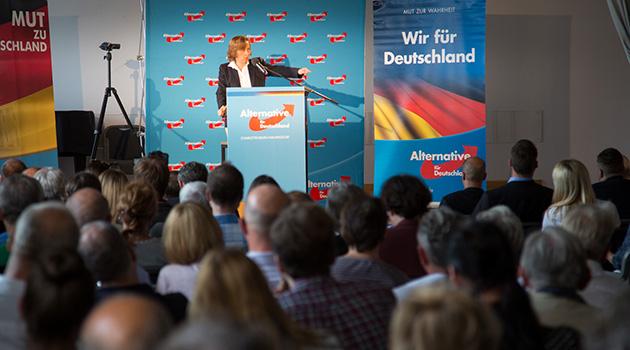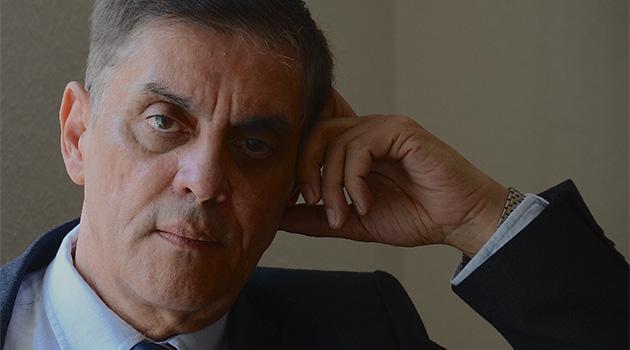Alternative for Germany, the anti-immigration populists, arguing internally over whether 10 % of the vote is success

National legislators with the anti-immigration Alternative for Germany (AfD) have completed a stormy constitutive session on the fate of two of their colleagues, an internal dispute that continued during the election of the co-chairs of the faction in the national legislature, who became the frontrunners Tino Chrupalla, who is also party co-chair, and Alice Weidel, despite the objections of some members. The leaders of the party proper, Chrupalla and Jörg Meuthen, disagree about the party’s results in the recent election.
The AfD organization for youth is also taking exception to the results. The AfD is considered so populist as to be ultra-right and won 10.3 % of the vote in the recent elections to the German parliament, or 2.3 % less than four years ago.
According to Chrupalla, who is categorized as falling into the nationalist, right-wing stream of the AfD, the party showed in these elections that it has become an established force in politics. “The party achieved a stable result,” Chrupalla said.
Meuthen, on the other hand, who is considered a moderate in the AfD context, spared no criticism of the lower result. “This outcome cannot be justified according to the models of the older parties,” he said at a joint press conference with Chrupalla and Weidel.
The AfD faction leaders in the national legislature disagreed with Meuthen’s assessment and Weidel said that she was refusing to be disappointed by the result. “Nobody will convince me of that,” Weidel said.
These differing attitudes on the assessment of the results are not just associated with the fact that the party has actually lost some voters, but are also related to the choice of the duo who were the party’s frontrunners. Meuthen had wanted to counterbalance Chrupalla’s influence by running the more moderate Joana Cotar of Hessen instead of Weidel, who is perceived as a backer of the nationalist, right-wing stream in the party, but he did not succeed with that plan.
However, even more tempestuous than the Chrupalla vs. Meuthen press conference was the constitutive session of the AfD faction in the national legislature, where the party now has 83 seats instead of the previous 94, and 25 are held by newcomers. The daily Die Zeit noted that while the AfD group of national lawmakers is smaller, it is a bit more radical.
For example, one of the new AfD MPs is former professional soldier Hannes Gnauck, who has been classified as an extremist by the counter-intelligence service for the German military. Gnauck is forbidden to wear a military uniform in Germany because of his dubious past and is only allowed to enter military facilities when expressly invited.
Another newcomer is Mattias Helferich from North Rhine-Westphalia, who because of his allusions to Nazism is even suspected of radicalism by the party itself, which suspended him from his function within the party during the campaign. Helferich has described himself in an online chat as the friendly face of National Socialism and as a democratic version of Roland Freisler.
Freisler was an infamous Nazi judge who sent many of Adolf Hitler’s opponents to their deaths and personally attended the conference in Wannsee where the Nazi high command coordinated the murder of Europe’s Jewish population. Because of his controversial past, Helferich’s colleagues do not want him in the faction, and that resulted in his leaving the hall during the constitutive session.
According to other AfD MPs, Helferich wants to apply for guest status within the faction, but he has not expressed his view of the incident. The cellist Matthias Moosdorf of Saxony also struggled with problems during the session, but eventually won a place in the faction.
German media have reported that Moosdorf’s fellow party members say he is a grumbler. Moosdorf has harshly criticized Alexander Gauland, who led the faction in the national legislature together with Weidel up until the elections.
Moosdorf had reproached Gauland for stubbornness and for being too understanding of the radical moves being made by some AfD adherents. According to Der Spiegel, the constitutive session debate was so abrupt that the legislators ended up expelling their co-workers from the hall.
The disputes also led to the election of the co-chairs of the faction being postponed. Gauland did not seek re-election to the post he had shared with Weidel, so Chrupalla decided to replace him.
The opposition within the party did its best to prevent the smooth re-election of Weidel, who had proposed limiting the function to one person only. Eventually the faction decided to keep two co-chairs, and Chrupalla and Weidel were elected to the posts.
The Young Alternative for Germany (JA), the AfD’s organization for youth, also did not contribute to calm inside the party. Carlo Clemens, head of the JA, declared in reaction to the party’s losses that it needs a clearer program, new faces, more sympathetic candidates and a changing of the guard in the future to attract younger voters.
“With an average age of 51.8 years, the AfD had the oldest candidates in the federal elections,” Clemens noted. He went on to say that while the results were not a catastrophe, the party cannot be satisfied with them.
